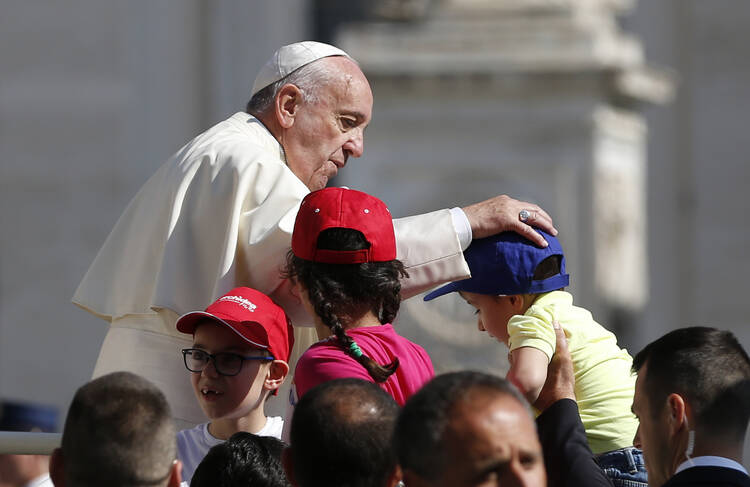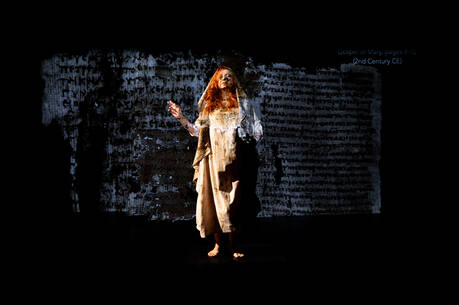A year ago this July, as Pope Francis apologized to a group of victims of sexual abuse by members of the clergy, he said the church must ask for “the grace to weep before the execrable acts of abuse which have left life-long scars.” He told them that his heart weeps in anguish when he recognizes that what was done to victims was “something more than despicable actions. It is like a sacrilegious cult, because these boys and girls had been entrusted to the priestly charism in order to be brought to God.” He also pledged decisive action that would bring this sense of horror, utter violation and sacrilege to the structure of church leadership by issuing policies that would hold bishops and religious superiors accountable. This spring, Pope Francis did just that, with the publication of “Like a Loving Mother.”
This decree has received wide coverage by the media and commentators. The major part of the decree outlines a process for the removal of church leaders for acts that do grave damage to the church. As a result, most reports and comments (whether favorable or not) have framed this decree as a tool to punish church leaders.
Those who applaud it note that finally church leaders will be held accountable. Those who criticize it object that nothing has changed. They decry that there is no tribunal as originally announced, and they question if handing this task off to four different Vatican offices will dilute the resolve to dismiss bishops for negligence, as the new document promises.
My reading of this decree leads me to believe that the pope has a much more inclusive agenda than the punishment of bishops, convinced as he is that church leaders should be held accountable and punished as a matter of justice if they are negligent. There is ample evidence throughout the document that the Holy Father is more concerned with ensuring within the church the protection of the young and the vulnerable in a sustainable way. In other words, while a process of accountability that holds church leadership personally responsible at all times is an important first step, the pope is saying that the church also must approach the task of safeguarding the little ones in a systemic and holistic way. This is to happen on a number of levels.
Christ’s Call
Pope Francis sets the stage in calling for a new comprehensive approach by providing a theological underpinning, announced in the very title of the document. Like a “Loving Mother,” he observes, the church protects with a special affection the small and weak because Christ has entrusted this task to the whole church. This task is not just the pope’s will, or a pragmatic response to a crisis. Rather, it is what Christ wants his church to do day in and day out. Protecting these little ones is a matter of our faith in Christ.
As a matter of faith, it is up to pastors, those who oversee particular churches, bishops and eparchs to see that this is done with care and diligence. What the pope is really saying to us bishops is that protecting children and vulnerable adults is at the core of our ministry. It is not to be an aside or an afterthought. The pope is telling us to expand our vision of what our ministry entails and embrace the fact that the safety of children and the vulnerable is integral to our servant leadership. Just as a bishop exercises his office of teaching, sanctifying and leading, the care of the young and the weak must also be woven into each of these three ministries. Just as a bishop organizes his diocese to ensure that the teachings of Christ are faithfully transmitted, that the sacraments are celebrated with the mind of the church and that his episcopal leadership reflects Christ, the head of the body, so too he must lead and organize his local church to ensure that the safety of children and the vulnerable is an unconditional priority for the entire church.
Article 2 of the document drives home this point by stating that even if the bishop is not subjectively morally culpable, he can be removed if he has “objectively failed in a very serious way in the diligence that is required of him by his pastoral office.” The removal of the bishop in such cases is less about punishment and more about correcting the breakdown in the system when it comes to keeping the weak and the small safe. That is the priority.
Since religious orders are very much a part of the church’s organizational structure and life, their superiors also share in this duty and in this regard are “equivalent to the diocesan bishop and the eparch ” (Article 4). They, too, are accountable for keeping children safe and for contributing to a systemic approach to insure child safety.
Additionally, while some, even within the church, have attempted to portray child abuse by clerics as a problem unique to the Anglophone world or the West, the pope makes it clear that the systemic transformation he is calling for is meant for the universal church. As such, bishops and superiors around the world will now need to take a serious look at how they will respond to this decree. This is especially true for those parts of the world where the state does not protect children through legislation or where society is indifferent to such measures. In many cases this may require bishops and superiors to offer a prophetic witness, going beyond social mores and legal practice, as they conform to the norm of the universal church. The status quo in a given country cannot be a defense, nor can ignorance of the church’s norm or its meaning. An objective violation is done at the risk of dismissal.
Finally, by involving four congregations in addition to the Congregation for the Doctrine of the Faith in this process (Bishops, Evangelization of Peoples, Oriental Churches, and Institutes of Consecrated Life and Societies of Apostolic Life), the pope is asking for a systemic change within the offices of the Holy See as well. Some critics object that the involvement of so many dicasteries will delay or impede action. But by including all of these Vatican offices in a system of accountability, Pope Francis is making clear that every leader in the Catholic Church has responsibility for child protection—those in missionary lands, religious superiors, eparchs and all diocesan bishops as well as Vatican officials. The intention is to bring about a systemic transformation throughout the entire church in order to respond to the will of Christ.
A Place of Safety
Having ministered to many victim survivors of clerical sexual abuse, I believe this development can be a source of healing and reconciliation. It also should give parents confidence that their children are safe in the church, as no one is exempt from accountability. Victims and so many others have complained repeatedly, and rightly so, that the lack of accountability on the part of bishops has added to the suffering they have already endured as a result of abuse. Victims now know that not only will bishops and superiors be held accountable, but that they risk their office through neglect. Moreover, priests have long complained that all penalties were directed against priests, and bishops were not held responsible. That is no longer the case: this loophole has now been closed.
But even beyond the issues of accountability and justice, Pope Francis has taken a historic step to ensure the protection of the young and weak in a sustainable way. Touched in the depth of his heart by the sufferings of victims, the pope in this decree outlines an inclusive system of accountability that begins with holding church leadership personally responsible, but does not end there. It provides a comprehensive plan for integrating the protection of the young and vulnerable into the very mission Christ has given to the church, so that this great tragedy never happens again.
The caution, of course, is that the details of this decree must be effectively implemented. That must involve, as Pope Francis told the group of victims he visited with last July, “the training of church personnel in implementing (these) policies and procedures.” It will require all of us in the church to do our part. The pope’s program, in its very breadth and structured internalization, entrusts the mission of protection not only to those in episcopal leadership, but instead points to a sense of needed vigilance within the whole community of the church, which makes up for episcopal leadership when it fails. He is reminding all of us who we claim to be, a church the little ones should always be able to count on, like a loving mother.








